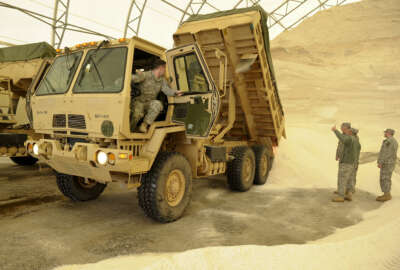
Army sets up program to help credential soldiers before they leave military
The Army is starting a limited user test for its Credentialing Assistance Program to encompass 1,500 soldiers.
A handful of soldiers are now able to receive funding for civilian-sector vocational credentials and academic degrees they pursue while still in the Army.
The new Army Credentialing Assistance Program allows soldiers to voluntarily work on training and educational programs for a vocational, associate’s or bachelor’s degree in military training facilities while off duty, Under Secretary of the Army Ryan McCarthy told reporters Monday at the Pentagon.
The limited user test will encompass about 1,500 soldiers at Fort Hood, Texas.
“This is extremely important because if you think about the Army, 60 percent of our enlisted soldiers are combat arms. They have challenges because of the technical gap associated with finding employment with the private sector,” McCarthy said.
The undersecretary added his own father was a victim of that gap during the Vietnam era.

“He ran out of GI Bill and struggled, and never got a college degree,” McCarthy told reporters at the Pentagon. “We’re going to be able to work with states. We’re going to start with Texas, but we are going to work all around the country to credential soldiers with coursework that they get in the Army.”
The program authorizes payment for classroom, hands-on, and blended or online training. It also covers manuals, study guides, books, testing fees and other recertification fees.
The credentialing assistance is especially helpful to soldiers who do not want to get a full college degree or work in a field that requires a college degree.
For instance, someone interested in plumbing could obtain the credentials and classes he or she needs through the assistance program.
The program gives soldiers the option of taking three tracks: credentialing related to the soldier’s occupational specialty, credentials that relate to an academic degree or certificate or credentials for a vocation to gain or increase technical expertise.
Soldiers must meet with an education counselor to establish a credentialing plan to receive approval for the program.
Congress previously worked on addressing credential and educational gaps for soldiers returning to the civilian world. The 2012 defense authorization bill established programs in military schoolhouses that can award professional credentials in specialized fields.
The 2015 defense authorization bill expanded that authority and allowed the Army to train soldiers in credentials that were not directly linked to military occupations.
The Transportation Department started working on the issue of cross-credentialing military truck drivers with civilian commercial drivers licences in July, when it started a pilot program to hire young reservist truckers in the private sector.
The Army is trying to bridge the academic and technical gap in mandatory training as well. The Army changed its education system to make it easier for soldiers to obtain college credit and occupational credentials while attending mandatory training.
“Across all spectrums of education [basic training] to the sergeant major academy there are no more multiple choice questions. Writing will be important, it will be critical to the [noncommissioned officer] to be able to write complete thoughts,” Chief Sgt. Maj. David Turnbull, command sergeant major for the U.S. Army Combined Arms Center said in March. “The content will have more practical application, assessments are going to be based on abilities and outcomes instead of ‘yes or no’ questions, and we are going to focus on leader competencies and their attributes.”
Those credits and credentials are more focused on improving a soldier’s ability and skills while in the Army.
Copyright © 2025 Federal News Network. All rights reserved. This website is not intended for users located within the European Economic Area.
Scott Maucione is a defense reporter for Federal News Network and reports on human capital, workforce and the Defense Department at-large.
Follow @smaucioneWFED




